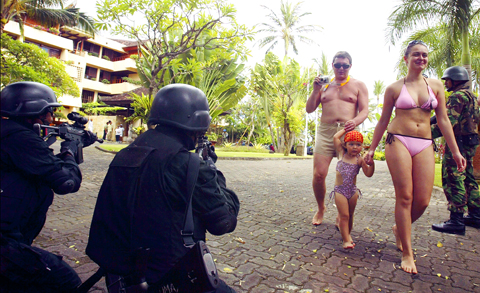Indonesian security forces stormed airports, glitzy hotels, passenger ships and the Jakarta Stock Exchange building yesterday in a massive anti-terrorism drill in the world’s most populous Muslim nation.
About 7,000 police, soldiers and emergency-response workers were taking part in the exercise held in six major cities, including the capital, Jakarta, and on the popular resort island of Bali.
Indonesia has been hit by a string of deadly suicide bombings targeting Westerners in the wake of the Sept. 11, 2001, attacks on the US. However, experts say the risk of more large-scale attacks has diminished with the arrest of hundreds of suspects.

PHOTO: AP
Indonesian President Susilo Bambang Yudhoyono said, however, last month’s militant rampage in the Indian city of Mumbai that left 164 dead highlighted the need to remain alert.
Indonesian television broadcast live footage of black-clad counterterrorism forces dropping by helicopter onto the roof of the five-star Borobudur Hotel before blasting through windows to release screaming hostages, leaving a trail of shattered glass.
In another scenario at a local airport, mock-terrorists seized an airplane carrying the president, killing the pilot and dumping the body onto the tarmac. After a 90-minute standoff, security forces overpowered ransom-demanding militants.
Similar drills will be held on Bali, which has suffered two series of suicide bombings in 2002 and 2005 that killed more than 220 people, many of them foreign tourists.
Security forces also will “storm” a ship in the Strait of Malacca, among the world’s busiest shipping lanes, in a bid to free hundreds of passengers seized in another mock-raid, national police spokesman Abubakar Nataprawira said.
Members of regional militant group Jemaah Islamiyah have been blamed for all of the recent suicide bombings in Indonesia, as well as a number of failed terrorism plots in Southeast Asia.
The last major attack in Indonesia occurred three years ago.

Kehinde Sanni spends his days smoothing out dents and repainting scratched bumpers in a modest autobody shop in Lagos. He has never left Nigeria, yet he speaks glowingly of Burkina Faso military leader Ibrahim Traore. “Nigeria needs someone like Ibrahim Traore of Burkina Faso. He is doing well for his country,” Sanni said. His admiration is shaped by a steady stream of viral videos, memes and social media posts — many misleading or outright false — portraying Traore as a fearless reformer who defied Western powers and reclaimed his country’s dignity. The Burkinabe strongman swept into power following a coup in September 2022

‘FRAGMENTING’: British politics have for a long time been dominated by the Labor Party and the Tories, but polls suggest that Reform now poses a significant challenge Hard-right upstarts Reform UK snatched a parliamentary seat from British Prime Minister Keir Starmer’s Labor Party yesterday in local elections that dealt a blow to the UK’s two establishment parties. Reform, led by anti-immigrant firebrand Nigel Farage, won the by-election in Runcorn and Helsby in northwest England by just six votes, as it picked up gains in other localities, including one mayoralty. The group’s strong showing continues momentum it built up at last year’s general election and appears to confirm a trend that the UK is entering an era of multi-party politics. “For the movement, for the party it’s a very, very big

ENTERTAINMENT: Rio officials have a history of organizing massive concerts on Copacabana Beach, with Madonna’s show drawing about 1.6 million fans last year Lady Gaga on Saturday night gave a free concert in front of 2 million fans who poured onto Copacabana Beach in Rio de Janeiro for the biggest show of her career. “Tonight, we’re making history... Thank you for making history with me,” Lady Gaga told a screaming crowd. The Mother Monster, as she is known, started the show at about 10:10pm local time with her 2011 song Bloody Mary. Cries of joy rose from the tightly packed fans who sang and danced shoulder-to-shoulder on the vast stretch of sand. Concert organizers said 2.1 million people attended the show. Lady Gaga

SUPPORT: The Australian prime minister promised to back Kyiv against Russia’s invasion, saying: ‘That’s my government’s position. It was yesterday. It still is’ Left-leaning Australian Prime Minister Anthony Albanese yesterday basked in his landslide election win, promising a “disciplined, orderly” government to confront cost-of-living pain and tariff turmoil. People clapped as the 62-year-old and his fiancee, Jodie Haydon, who visited his old inner Sydney haunt, Cafe Italia, surrounded by a crowd of jostling photographers and journalists. Albanese’s Labor Party is on course to win at least 83 seats in the 150-member parliament, partial results showed. Opposition leader Peter Dutton’s conservative Liberal-National coalition had just 38 seats, and other parties 12. Another 17 seats were still in doubt. “We will be a disciplined, orderly